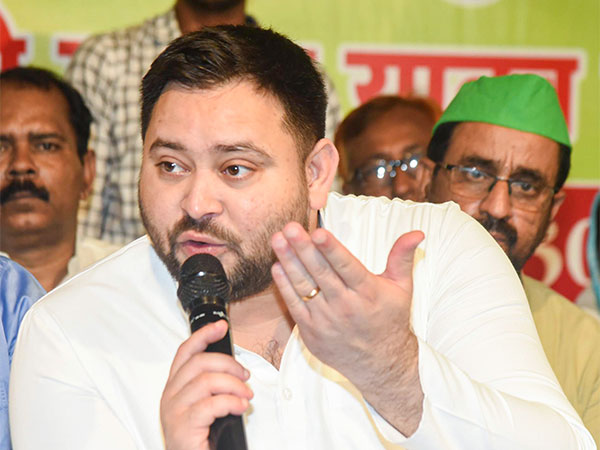
Rashtriya Janata Dal (RJD) leader Tejashwi Yadav has vehemently criticized the Nitish Kumar-led NDA government in Bihar in the wake of a tragic hooch incident, claiming that the liquor ban represents the “largest corruption” under Nitish Kumar’s administration. He alleged that, under the pretense of the Janata Dal United (JDU) party, a parallel economy worth ₹30,000 crores is being operated.
Yadav accused Kumar of hypocrisy, noting that during his earlier tenures, he opened “thousands of liquor shops” and is now trying to present himself as a virtuous figure following the recent tragedy that resulted in the deaths of 33 individuals—28 from Siwan and 5 from Saran. This incident has ignited a political confrontation, with opposition parties questioning the effectiveness of the liquor ban imposed by Kumar.Taking to X, Yadav stated, “The Chief Minister who established liquor shops on every corner of Bihar and has caused countless deaths due to toxic liquor in the name of prohibition is now acting like a saint. In his first decade in office, Kumar took steps that led to increased alcohol consumption in Bihar and is currently facilitating the illegal liquor trade.”
He challenged Kumar to deny his claims.Yadav provided statistics indicating that liquor shops in rural Bihar surged from under 500 in 2004-05 to 2,360 in 2014-15, with total state liquor shops doubling from 3,000 to over 6,000 in the same period. He also pointed out that prior to Kumar’s tenure, an average of 51 liquor outlets opened daily, a figure that dramatically escalated to 300 per day during the next decade.He further alleged that confiscated liquor is often sold in the market with the complicity of JDU officials, the liquor mafia, and police personnel. Citing a National Family Health Survey, Yadav claimed that despite the ban, alcohol consumption in Bihar surpasses that of Maharashtra. “Yet Nitishji insists that prohibition is effective in Bihar—what a farce,” he remarked.Yadav also noted that over 400 people have been apprehended in connection with alcohol-related offenses in the state despite the prohibition. He concluded by emphasizing that the liquor ban signifies the greatest corruption of Nitish Kumar’s administration, and that an illegal liquor business yielding ₹30,000 crores is directly benefiting JDU leaders.In response to the ongoing crisis, Gopalganj Superintendent of Police Awdhesh Dixit announced that a Special Investigation Team (SIT) is investigating the hooch tragedy, leading to the arrest of 14 individuals and conducting raids in over 200 locations.
Rashtriya Janata Dal (RJD) leader Tejashwi Yadav has vehemently criticized the Nitish Kumar-led NDA government in Bihar in the wake of a tragic hooch incident, claiming that the liquor ban represents the “largest corruption” under Nitish Kumar’s administration. He alleged that, under the pretense of the Janata Dal United (JDU) party, a parallel economy worth ₹30,000 crores is being operated.
Yadav accused Kumar of hypocrisy, noting that during his earlier tenures, he opened “thousands of liquor shops” and is now trying to present himself as a virtuous figure following the recent tragedy that resulted in the deaths of 33 individuals—28 from Siwan and 5 from Saran. This incident has ignited a political confrontation, with opposition parties questioning the effectiveness of the liquor ban imposed by Kumar.
Taking to X, Yadav stated, “The Chief Minister who established liquor shops on every corner of Bihar and has caused countless deaths due to toxic liquor in the name of prohibition is now acting like a saint. In his first decade in office, Kumar took steps that led to increased alcohol consumption in Bihar and is currently facilitating the illegal liquor trade.” He challenged Kumar to deny his claims.
Yadav provided statistics indicating that liquor shops in rural Bihar surged from under 500 in 2004-05 to 2,360 in 2014-15, with total state liquor shops doubling from 3,000 to over 6,000 in the same period. He also pointed out that prior to Kumar’s tenure, an average of 51 liquor outlets opened daily, a figure that dramatically escalated to 300 per day during the next decade.
He further alleged that confiscated liquor is often sold in the market with the complicity of JDU officials, the liquor mafia, and police personnel. Citing a National Family Health Survey, Yadav claimed that despite the ban, alcohol consumption in Bihar surpasses that of Maharashtra. “Yet Nitishji insists that prohibition is effective in Bihar—what a farce,” he remarked.
Yadav also noted that over 400 people have been apprehended in connection with alcohol-related offenses in the state despite the prohibition. He concluded by emphasizing that the liquor ban signifies the greatest corruption of Nitish Kumar’s administration, and that an illegal liquor business yielding ₹30,000 crores is directly benefiting JDU leaders.
In response to the ongoing crisis, Gopalganj Superintendent of Police Awdhesh Dixit announced that a Special Investigation Team (SIT) is investigating the hooch tragedy, leading to the arrest of 14 individuals and conducting raids in over 200 locations.
